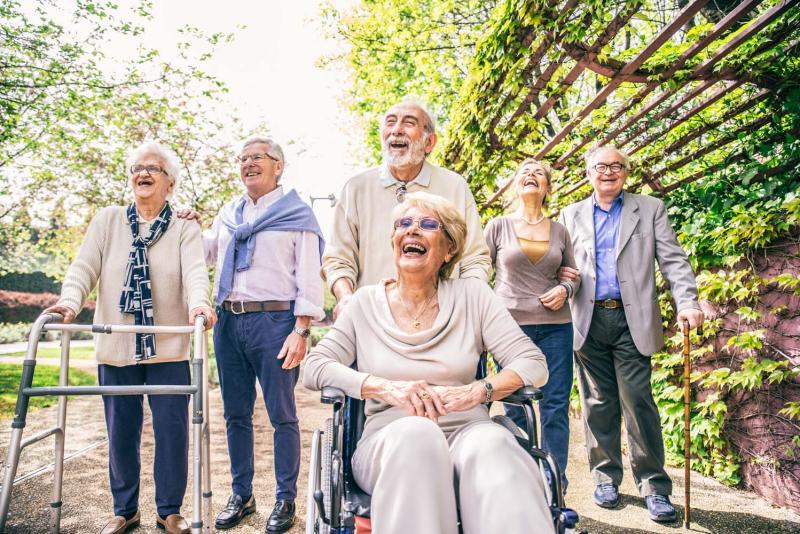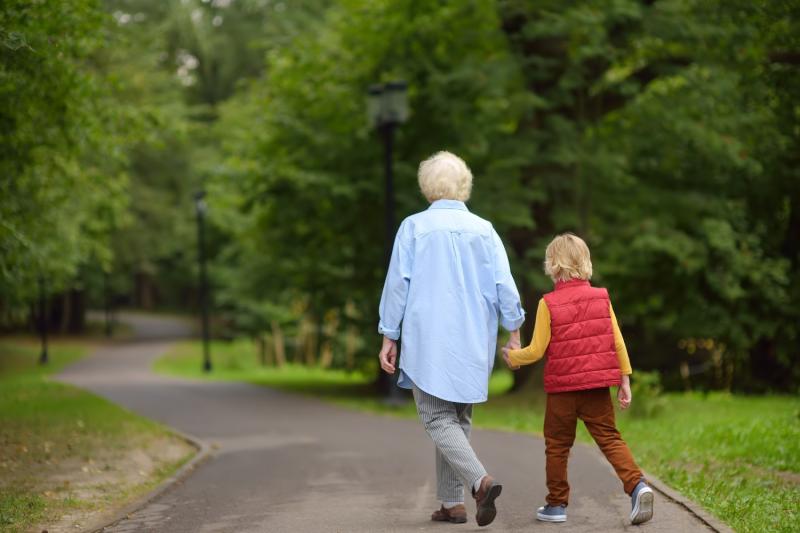Key points
- Engaging in meaningful activities is thought to provide a sense of purpose and pleasure to people living with dementia.
- Evidence from 13 systematic reviews showed that meaningful activity engagement improved psychological wellbeing, and reduced eating difficulties, sleep disturbances, anxiety, and stress.
- The impact of meaningful activity engagement on outcomes such as responsive behaviours, quality of life, depression, mood, agitation, cognitive functioning, and carer distress was inconclusive.
- Studies that assessed the relationship between meaningful activity engagement and outcomes such as independence, medication use, the impact of supporting a person with dementia, and carer depression and quality of life found no effect.
Engaging in meaningful activities is thought to benefit people living with dementia. Activities vary. Some may involve activities outside of a person’s home or usual care setting (e.g., aquatic exercise, horse riding). Others may focus on personally tailored activities which are based on an assessment of personal interests or preferences. This could involve activities such as gardening, craft, or cooking. [1] Meaningful activity engagement aims to improve psychosocial outcomes such as responsive behaviours, social participation, and quality of life.
This evidence theme on meaningful activity is a summary of one of the key topics identified by a scoping review of dementia research. If you need more information on this topic, try using the PubMed search below.
We found 13 systematic reviews that examined the impact of activities on specific outcomes for people living with dementia. These reviews reported some benefits of meaningful activity engagement including reductions in:
- Difficulties with eating (activities included Montessori-based activities) [2, 4]
- Sleep disturbances (activities included wheelchair cycling) [3]
- Stress (activities included intergenerational volunteering) [3]
- Intense walking. [5]
Benefits also included improvements in:
- Psychological wellbeing (when activities included swimming) [3]
- Eating independence and self-feeding frequency (Montessori-based activities). [4]
The effectiveness of meaningful activity engagement is inconclusive for some outcomes. These outcomes include:
- Responsive behaviours (when activities included swimming, personally tailored activities, and outdoor activities) [1, 3, 6]
- Anxiety (activities included intergenerational volunteering) [3, 7]
- Quality of life (including an arts-based program and personally tailored activities) [1, 3, 8]
- Depression and mood (activities included wheelchair cycling, arts-based program, horse riding, music, and personally tailored activities) [1, 3, 8, 9, 10]
- Cognitive functioning (including arts-based intervention, music, and Montessori-based activities) [2, 3, 9]
- Agitation (activities included outdoor activities, garden use, simulated family presence and music activities) [6, 9-12]
- Carer distress (including personally tailored activities). [8]
The evidence here is inconclusive because some studies report the benefits of meaningful activity engagement, while others report no benefits. Similarly, evidence is inconclusive as to whether activity-based interventions are most effective when customised to the individual. [7] One review found benefit in customised activities [7], and another found little to no benefit (to mood or affect) of personally tailored activities compared to usual care. [9]
There was no clear evidence of benefit for some outcomes. In other words, studies have assessed the relationship between meaningful activity engagement and these outcomes, but no benefit was reported. These outcomes include:
- Independence (when activities include outdoor gardening) [3]
- Ability to manage self-care (activities include art gallery-based interventions) [13]
- Psychotropic medication use (non-facilitated meaningful activities) [10]
- The impact of supporting someone with dementia (sometimes referred to as ‘carer burden’), carer depression, or quality of life (personally tailored activities). [8]
No adverse effects were observed for those in residential aged care. [1] Adverse events were not reported for those living in the community. [8]
The reviews highlighted concerns about the methods used in some of the studies. This reduces the degree of certainty we might have about the benefits of meaningful activity engagement. For example:
- Immediate benefits were assessed, but ongoing benefits were often not measured. [2, 10]
- Studies were not always clear about the type, frequency, intensity, and duration of the activities involved. [2]
- Studies often did not compare the effectiveness of meaningful activity engagement across different stages of dementia. [1, 8]
- Some studies only had a small number of participants. [1, 2, 7, 8]
- Potentially important outcomes were not assessed (e.g., adverse events for those living in the community, falls). [3, 8]
- Consider the interests and preferences of the individual living with dementia and tailor activities to their interests, preferences, and competencies.
- Encourage people living with dementia to get involved in activities of everyday living (e.g., watering plants, setting tables, tidying, preparing for events) where possible.
- Consider that activities are often provided as part of respite services.
- See resources provided below.
- Set up an activity room in residential facilities (see resource below), providing a variety of activities, including activities that may promote engagement with others (staff/family/other residents).
- Encourage people living with dementia to get involved in activities of everyday living (e.g., watering plants, setting tables, tidying, preparing for events) where possible.
- Allow staff to take the time to support people in meaningful activity engagement.
- Möhler R, Renom A, Renom H, Meyer G. Personally tailored activities for improving psychosocial outcomes for people with dementia in long‐term care. Cochrane Database Syst Rev. 2018(2).
- Sheppard CL, McArthur C, Hitzig SL. A systematic review of Montessori-based activities for persons with dementia. J Am Med Dir Assoc. 2016;17(2):117-22.
- D'Cunha NM, Isbel S, McKune AJ, Kellett J, Naumovski N. Activities outside of the care setting for people with dementia: A systematic review. BMJ Open. 2020;10(10):e040753.
- Liu W, Galik E, Boltz M, Nahm ES, Resnick B. Optimizing eating performance for older adults with dementia living in long-term care: A systematic review. Worldviews Evid Based Nurs. 2015;12(4):228-35.
- MacAndrew M, Brooks D, Beattie E. Nonpharmacological interventions for managing wandering in the community: A narrative review of the evidence base. Health Soc. Care Community. 2019;27(2):306-19.
- Wang G, Albayrak A, van der Cammen TJM. A systematic review of non-pharmacological interventions for BPSD in nursing home residents with dementia: From a perspective of ergonomics. Int Psychogeriatr. 2019;31(8):1137-49.
- Brown Wilson C, Arendt L, Nguyen M, Scott TL, Neville CC, Pachana NA. Nonpharmacological interventions for anxiety and dementia in nursing homes: A systematic review. Gerontologist. 2019;59(6):e731-e42.
- Mohler R, Renom A, Renom H, Meyer G. Personally tailored activities for improving psychosocial outcomes for people with dementia in community settings. Cochrane Database Syst Rev. 2020;8:CD010515.
- Mohler R, Calo S, Renom A, Renom H, Meyer G. Personally tailored activities for improving psychosocial outcomes for people with dementia in long-term care. Cochrane Database Syst Rev. 2023;3:CD009812.
- Jones C, Liu F, Murfield J, Moyle W. Effects of non-facilitated meaningful activities for people with dementia in long-term care facilities: A systematic review. Geriatr Nurs. 2020;41(6):863-71.
- Livingston G, Kelly L, Lewis-Holmes E, Baio G, Morris S, Patel N, et al. Non-pharmacological interventions for agitation in dementia: Systematic review of randomised controlled trials. BJPsych. 2014;205(6):436-42.
- Whear R, Coon JT, Bethel A, Abbott R, Stein K, Garside R. What is the impact of using outdoor spaces such as gardens on the physical and mental well-being of those with dementia? A systematic review of quantitative and qualitative evidence. J. Am. Med. Dir. Assoc. 2014;15(10):697-705.
- Sampath P, Forbes DA, Barton S, Blake C. A systematic review of the effectiveness of interventions for persons living with dementia based in the home or community. Perspectives. 2015;38(2):6-19.
Connect to PubMed evidence
This PubMed topic search is limited to home care and residential aged care settings. You can choose to view all citations or citations to articles available free of charge.


